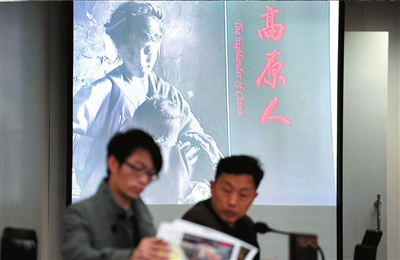Rather, I'm talking about a copyright case in China. That's right in China.
A photographer Xue Huake, is suing Yan Yaya, a painter well-known in China for her Tajik children paintings, of plagiarism. He accused the painter of using using his photographs for eight paintings being exhibited, auctioned and included in her monograph.
He demands Yan to stop infringement, apology, compensate for economic loss of 12 million Yuan (about 2 million US dollars), and to destroy those works.
The painter claimed that the photographer was only able to take pictures of the subjects through her connections. However, it seems her claims were mostly on this ground of returning a favor and she had not disputed the fact that she made those paintings without the knowledge, let alone permission of the photographer.
 The case is currently being tried in a district court in Beijing. It is worth pointing out that though copyrights infringement is rampant in China, authors and artists are increasingly keen to protect their rights. It was reported recently that more than 40 writers have signed a letter to accuse Baidu (a search engine which has a 75 percent market share in China, after the exit of Google) of providing their works for free to download on its online library Baidu Wenku, without their permission. The author said "Baidu has become a totally corrupt thief company" that runs a "marketplace of stolen goods."
The case is currently being tried in a district court in Beijing. It is worth pointing out that though copyrights infringement is rampant in China, authors and artists are increasingly keen to protect their rights. It was reported recently that more than 40 writers have signed a letter to accuse Baidu (a search engine which has a 75 percent market share in China, after the exit of Google) of providing their works for free to download on its online library Baidu Wenku, without their permission. The author said "Baidu has become a totally corrupt thief company" that runs a "marketplace of stolen goods."The Richard Prince case has been ruled in the favor of the photographer in the initial ruling and it would very interesting to see how the damage is judged and how the judgments will withstand any legal challenges.
Below is the excerpt of the report of Richard Prince case in New York Times:
A federal judge in Manhattan has ruled against the artist Richard Prince in a closely watched copyright case, finding that Mr. Prince – who is well known for appropriating imagery created by others – violated the law by using photographs from a book about Rastafarians to create a series of collages and paintings.
The decision, found in favor of Patrick Cariou, a photographer whose book "Yes Rasta," featuring portraits he took during several months in Jamaica, was published in 2000. According to the suit, Mr. Prince used 41 or more of the pictures from the book as the basis for a body of work he called "Canal Zone," which was shown in St. Barts and in a 2008 exhibition at the Gagosian Gallery in Chelsea. A gallery that was planning to show Mr. Cariou's photographs canceled that exhibition after learning that Mr. Prince had already created works based on the photographs.
Mr. Prince has argued that his use of the photographs should be allowed under fair-use exemptions to copyright protections, which allow limited borrowing of protected material for purposes like commentary, criticism, news reporting and scholarship. But Judge Batts wrote that for fair-use exceptions to apply, a new work of art must be transformative in the sense that it must "in some way comment on, relate to the historical context of, or critically refer back to the original works" it borrows from.
Mr. Prince testified in the case that he had no interest in the original meaning of the photographs he used. In creating the "Canal Zone" works he mainly used the imagery as a way to make references to painters like Picasso and Willem de Kooning and to connect the works to a postapocalyptic screenplay he was planning that featured a reggae band.
For that reason, and because Mr. Prince used the imagery for commercially available paintings, Judge Batts ruled that he and the Gagosian gallery violated Mr. Cariou's copyrights. She ordered all unsold copies of the "Canal Zone" paintings and other related works to be impounded and ordered that the gallery inform anyone who already owned copies of the works that it would be a violation of copyright laws to display them. She also ordered the parties to return to court in May to discuss possible damages.





No comments:
Post a Comment